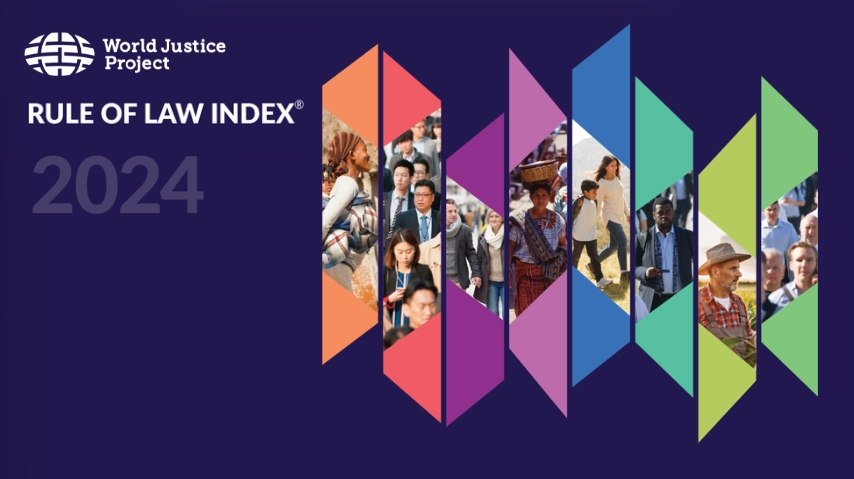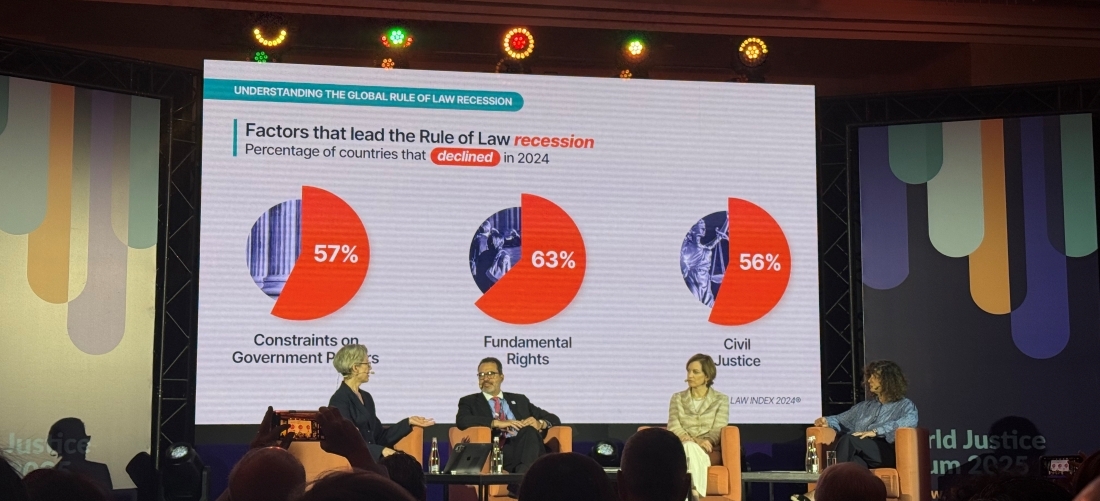Investing in the Rule of Law for Social and Economic Development

Speaking at the opening of the 8th World Justice Forum in Warsaw, Poland, Mary Beth Goodman, Deputy Secretary-General of the Organisation for Economic Co-operation and Development (OECD), underscored that effective justice institutions are at the heart of a well-functioning economy and investing in the rule of law is not only about democratic principles, it is a strategic necessity for both security and economic growth.
Citing an OECD–World Justice Project (WJP) White Paper (2019), she highlighted that unresolved legal problems can cost countries between 0.5% and 3% of GDP—an economic price nations pay if they fail to invest in justice systems. She stressed the urgent need to transition from institution-centered to people-centered justice.
Other global standard-setting institutions—including the European Union, United Nations, World Bank, and International Monetary Fund—have also emphasized the rule of law as central to social and economic development.
Yet, despite its importance, the rule of law is now facing unprecedented challenges worldwide. According to the WJP Rule of Law Index 2024, which assesses 142 countries across eight indicators, more than half experienced a decline in rule of law. This marks the seventh consecutive year of global deterioration, with a particularly sharp decline in constraints on government power: 59% of surveyed countries reported weakening checks on state authority. Strengthening legal frameworks and institutions to counter overreach has therefore become imperative.
This erosion of checks and balances echoes the words of Maria Ressa, 2021 Nobel Peace Prize laureate, in her opening address at the Forum:
“What we learned is that the laws are only as good as the lawmakers, the judges, the jounalists who fight the three C’s, coers, corrupt, co-opt. These are all related to power and money.”
The global rise in governmental overreach directly undermines the rule of law, making oversight and accountability across all sectors essential.
The report on the Rule of Law Index 2024 also revealed alarming declines in fundamental freedoms: rights to expression, assembly, and association decreased in nearly two-thirds of surveyed countries—the steepest drop since measurement began. Access to justice has also deteriorated due to court delays, state interference, digital divides, and limited resources. However, some progress has been observed in anti-corruption efforts compared to 2023 findings.
Charting a Way Forward: The Warsaw Principles
Against this backdrop, the World Justice Forum 2025 in Warsaw convened over 600 participants—including jurists, academics, civil society leaders, human rights defenders, international organizations, and media representatives from 87 countries. On 26 June 2025, they jointly adopted the Warsaw Principles for the Rule of Law as a global framework to reinforce the rule of law in the years ahead.
The Ten Warsaw Principles
- Principle 1: Strengthen institutional checks and balances to maintain the separation of powers, provide appropriate oversight, and ensure accountability
- Principle 2: Safeguarding the peaceful and lawful transfer of power through open, free, and fair elections or other constitutionally established procedures, in full accordance with national legal frameworks
- Principle 3: Protect civic space by ensuring media freedom, civil society engagement, and meaningful public participation
- Principle 4: Protect human rights and safeguard fundamental freedoms in line with international standards
- Principle 5: Promote integrity and accountability to eliminate corruption in both the public and private sectors
- Principle 6: Advance people-centered justice by strengthening independent, open, and effective justice systems that meet the needs of individuals and communities
- Principle 7: Safeguard the independence, integrity, and safety of lawyers and legal professional associations, ensuring they can perform their duties free from harassment, retaliation, or improper interference
- Principle 8: Advance the rule of law as a driver of sustainable development, environmental protection, and technological innovation
- Principle 9: Promote an enabling business environment grounded in the rule of law
- Principle 10: Foster collaboration, partnerships, and collective action to advance the rule of law
Thailand’s Rule of Law Score in 2024
The 2024 WJP Index identified Poland (+3.2%), Vietnam (+2.1%), and Sri Lanka (+1.6%) as the countries with the strongest improvements. Thailand also recorded a modest gain of +1.5%, ranking 78th out of 142 countries, with an overall score of 0.50, slightly below the global average of 0.55.


However, Dr. Phiset Sa-ardyen, Executive Director of the Thailand Institute of Justice (TIJ), cautioned in an interview with Nattha Komolvadhin (The Standard) that this should not be seen as a guarantee of long-term progress:
“It’s a matter of perception. Even judges from top-ranking countries like South Korea feel their rule of law is eroding. The key issue is not the numbers themselves, but how sensitively Thai society responds to them. Awareness is the starting point for change.”
TIJ’s Commitment: Bringing the Warsaw Principles to Thailand
TIJ, together with partners from government, civil society, and the private sector, has long been committed to advancing the rule of law in Thailand. Our ongoing initiatives already align with the Warsaw Principles—strengthening oversight and accountability, protecting civic space, combating corruption, and promoting people-centered justice to ensure broad, accessible, and inclusive pathways to justice.
At the World Justice Forum, TIJ was invited by OECD and WJP to present Thailand’s progress, led by Dr. Phiset Sa-ardyen, Executive Director, and Prof. Dr. Kittipong Kittayarak, Chair of the TIJ Board. Their presentations highlighted the role of Thailand’s National Rule of Law Steering Committee in advancing reform.
Prof. Dr. Kittipong emphasized the urgent need to build public trust in the justice system, rooted in judicial independence, democratic accountability, non-discrimination, and universal access to justice. He stressed that judges, lawyers, police, and prosecutors must collectively raise the standard of justice, with citizens as active participants.
TIJ also reported on its pioneering collaboration with OECD—becoming the first country to apply evidence-based innovation to rule of law reform. A joint study on the “economic cost of crime” revealed that in 2022, the impact of crime amounted to 5.6% of Thailand’s GDP.
Dr. Phiset noted that this underscores the importance of integrating modern tools, data, and innovation into justice reform—particularly in advancing open data and open government as effective entry points for civic oversight, anti-corruption, and broader reform.
TIJ’s participation also extended to special lectures and parallel sessions, where it highlighted the importance of strengthening judicial credibility, supporting civil society, and empowering youth in building a people-centered rule of law culture.
The World Justice Forum 2025, organized by the World Justice Project under the theme “Standing Up for the Rule of Law in Times of Global Decline,” took place in Warsaw from 23–26 June 2025.
References:
The full Warsaw Principles for the Rule of Law : World Justice Project
The Rule of Law Index 2024 : Thailand




